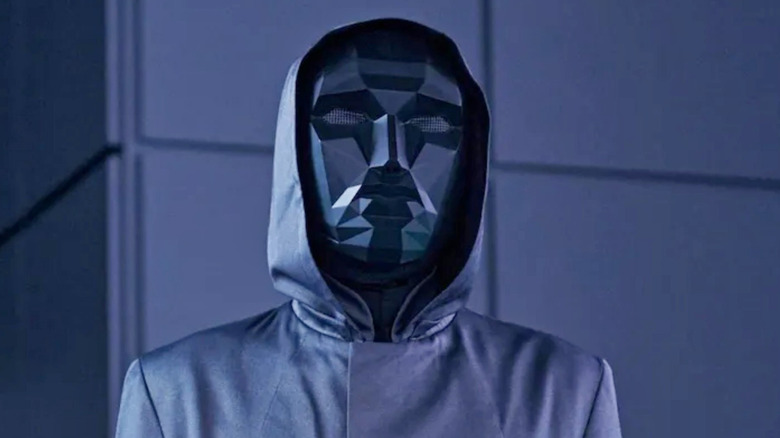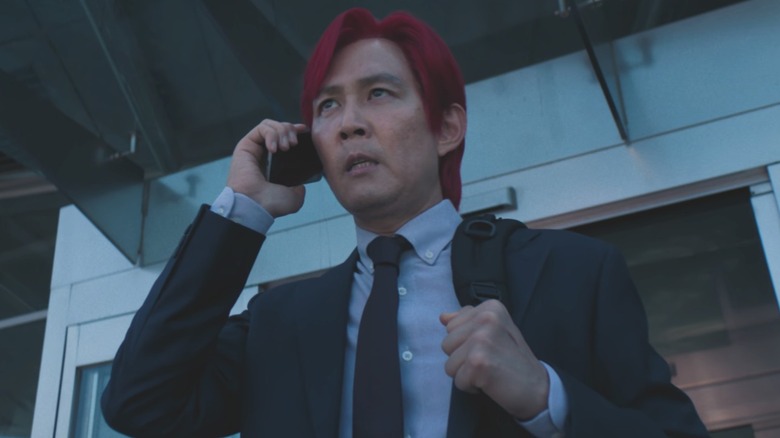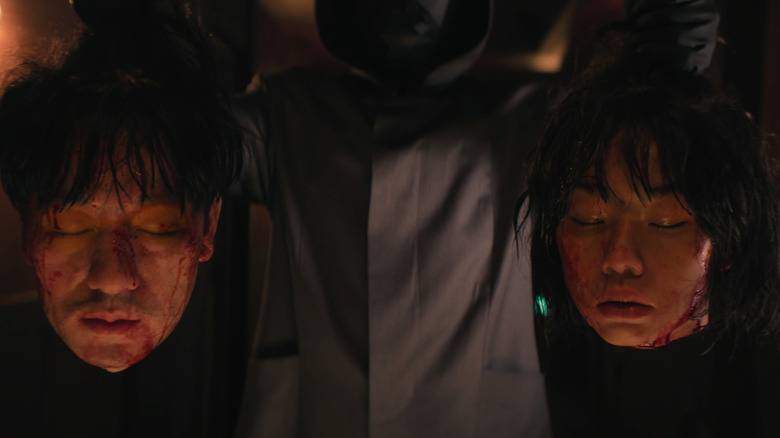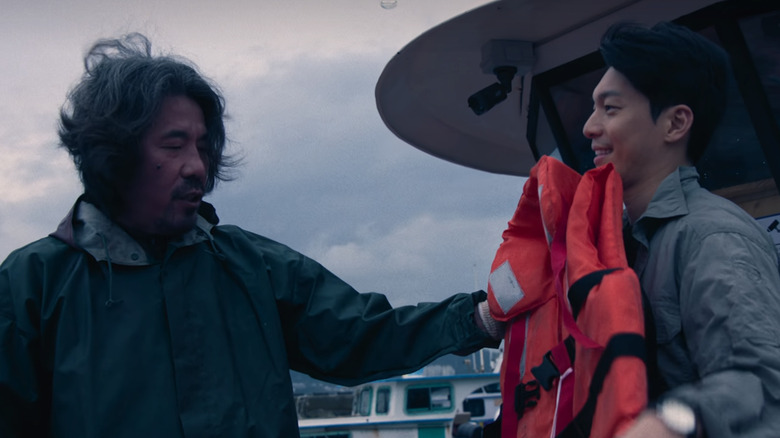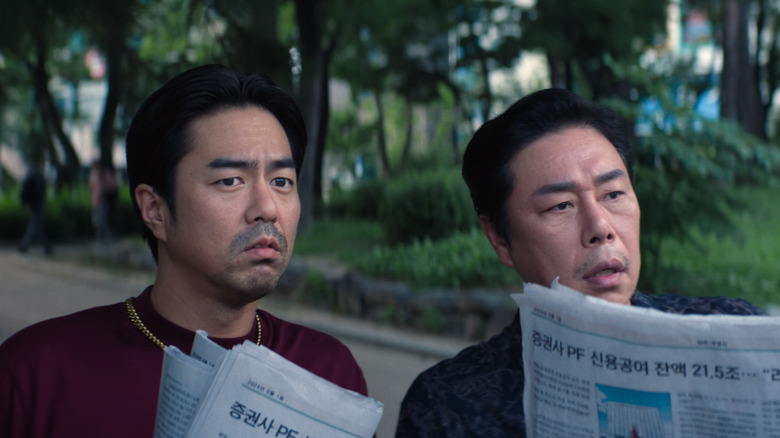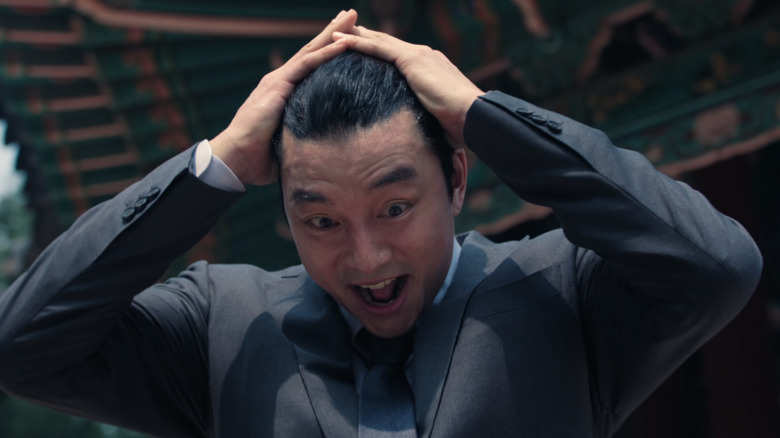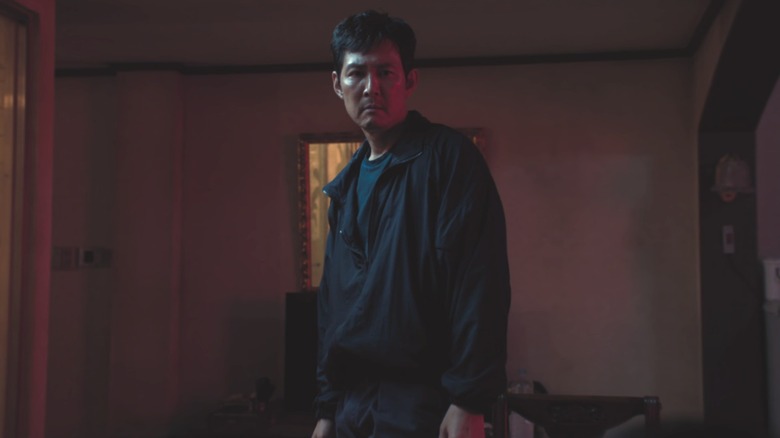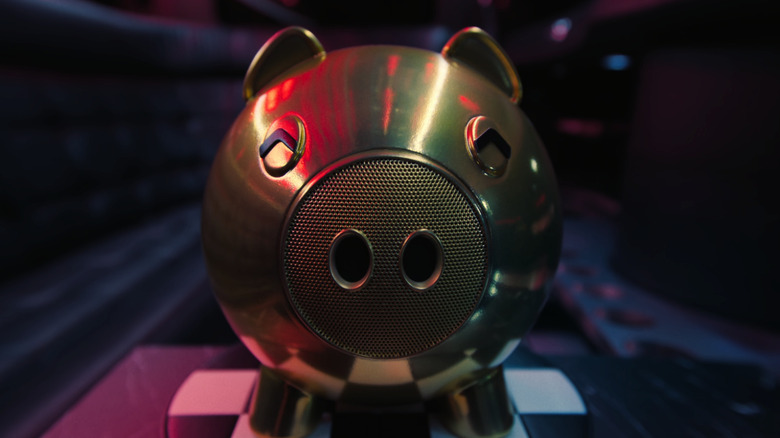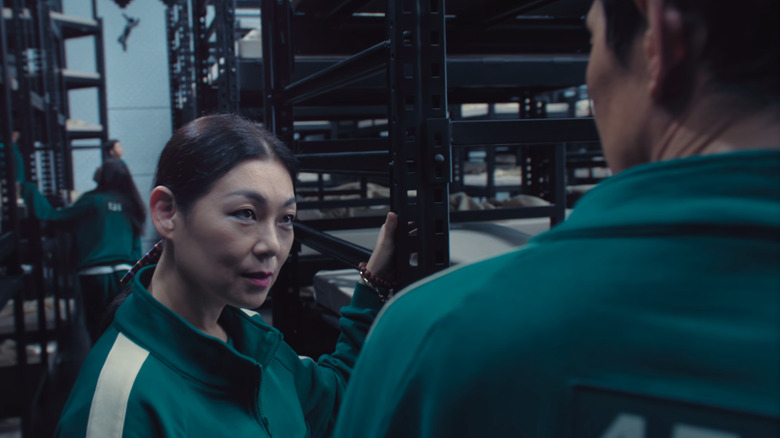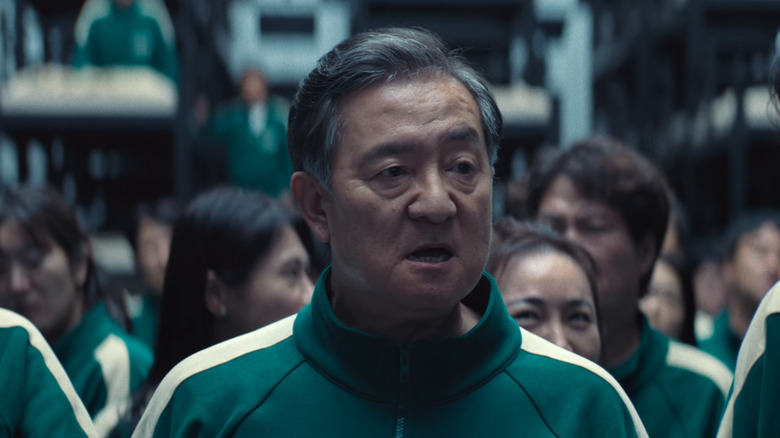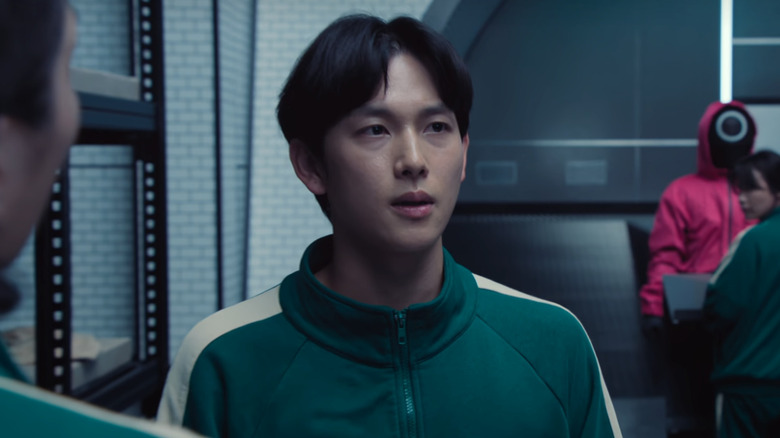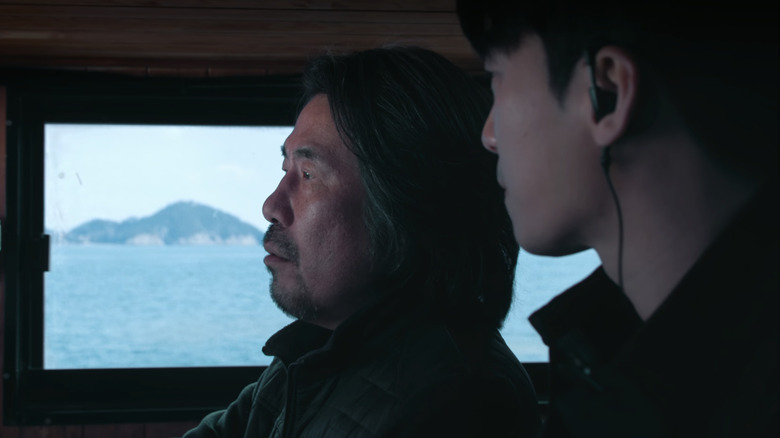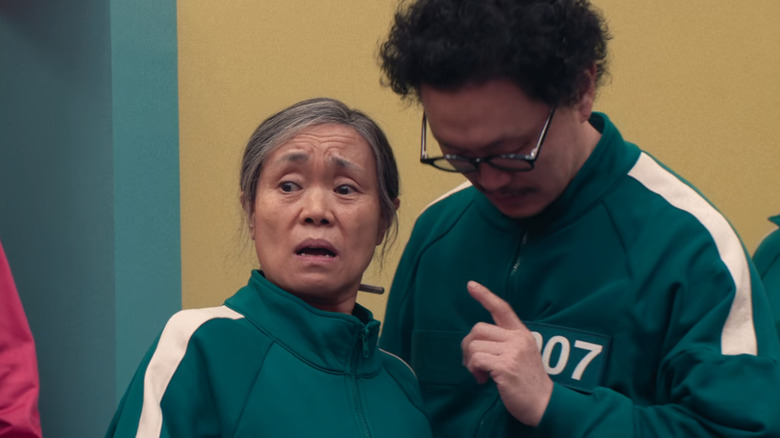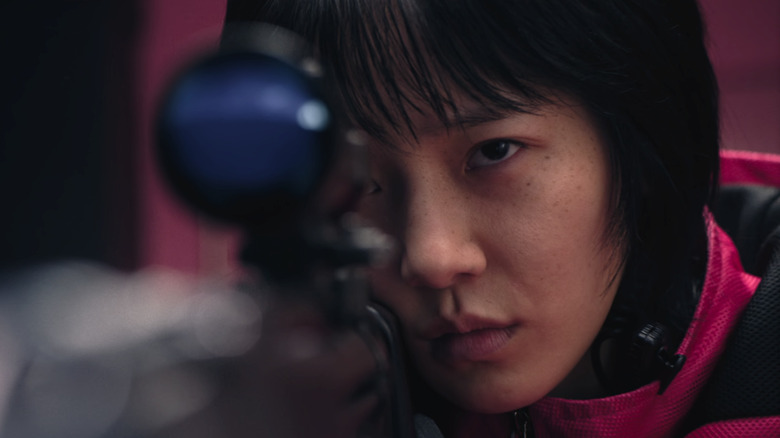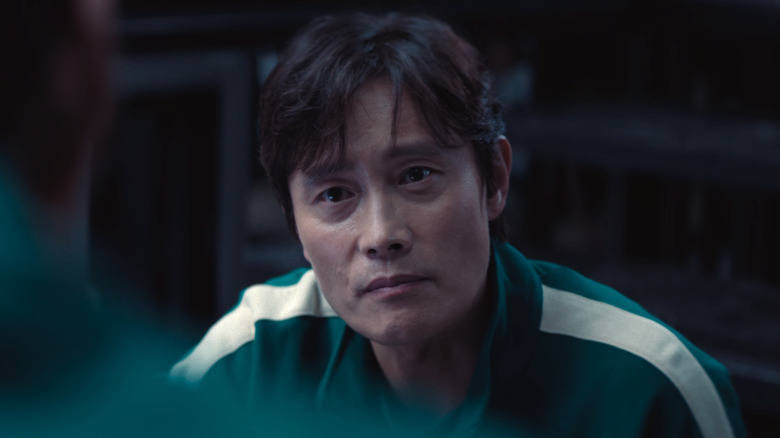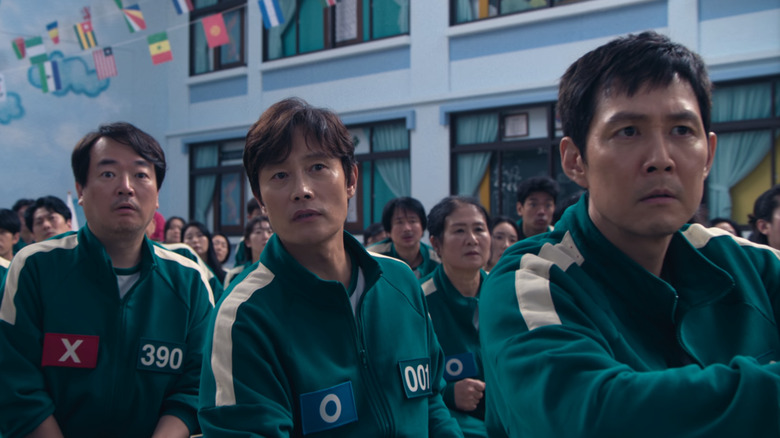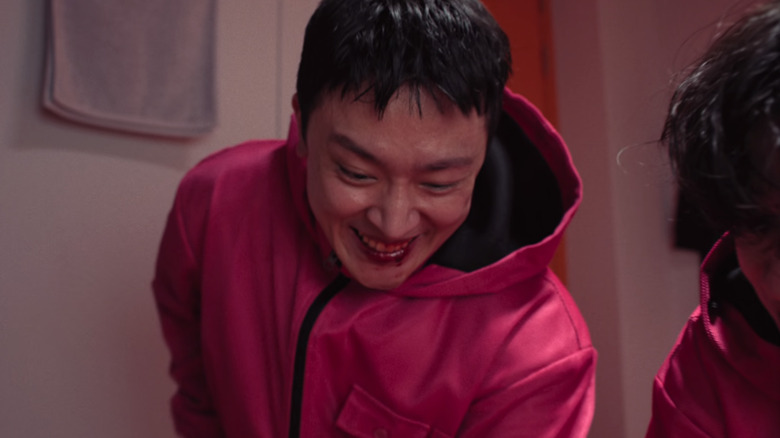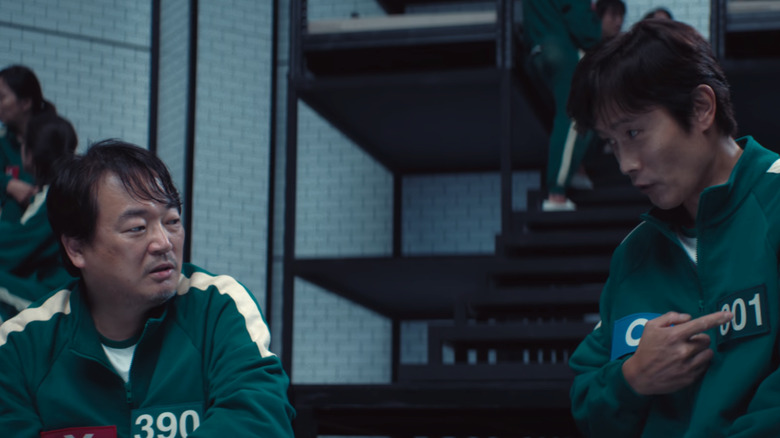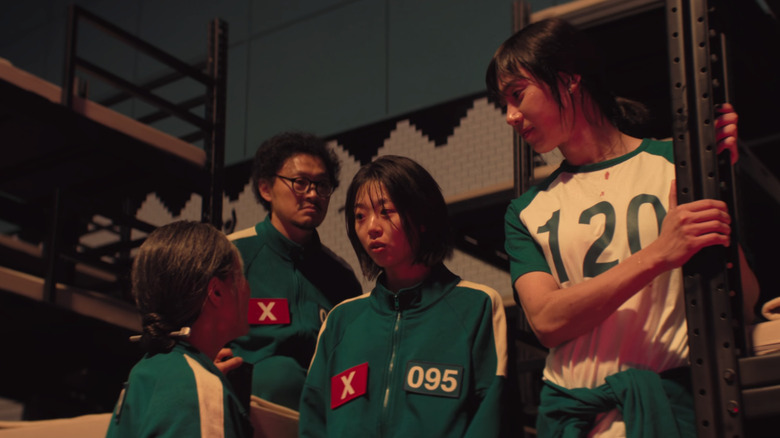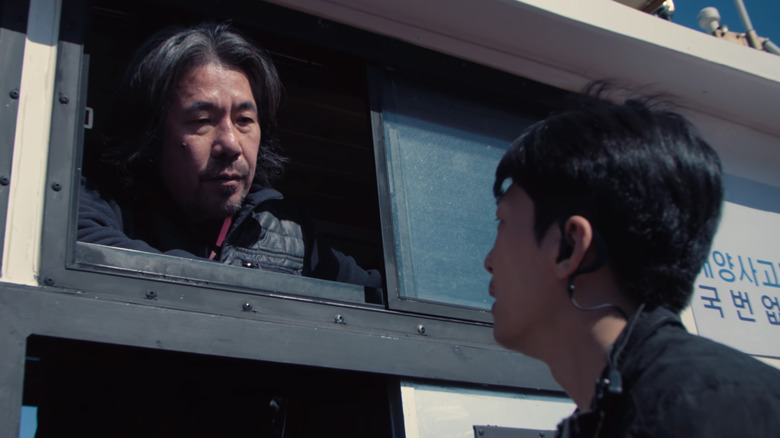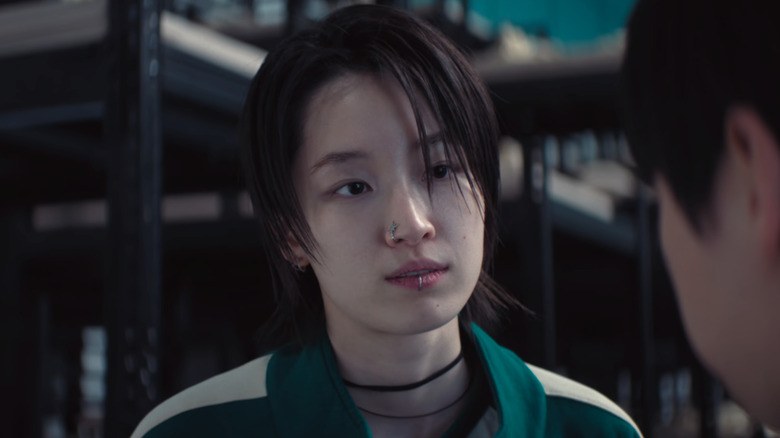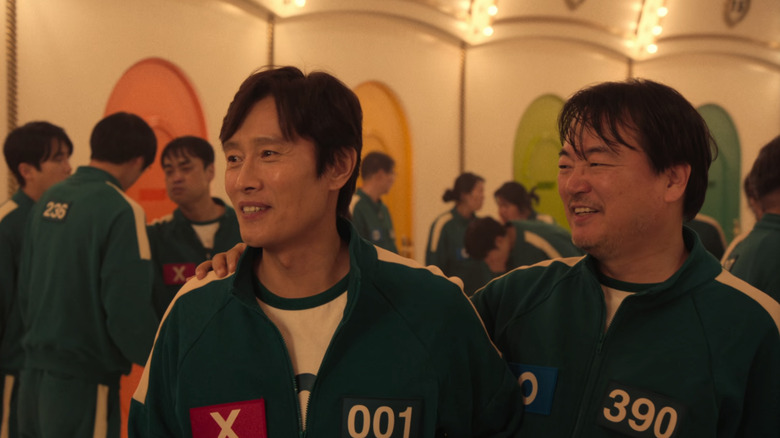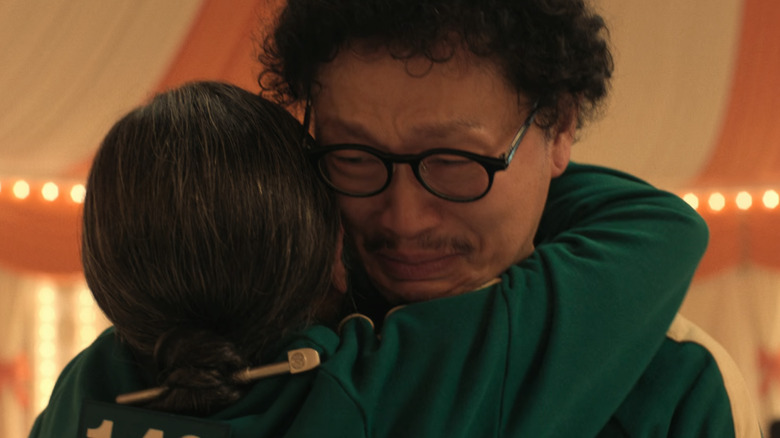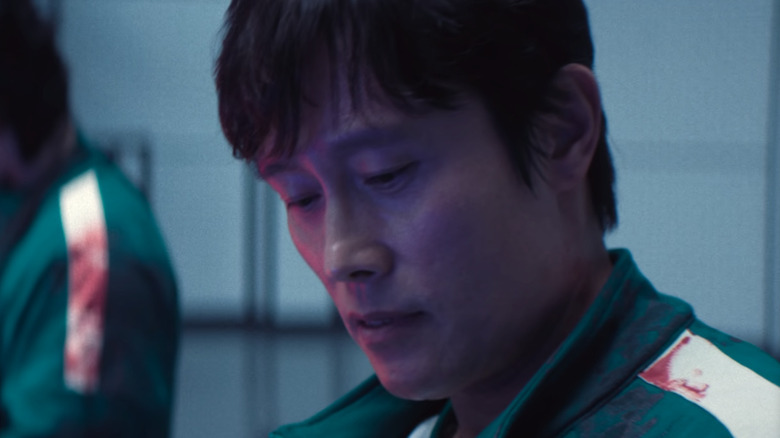Lines In Squid Game Season 2 That Mean More Than You Realized
Contains spoilers for "Squid Game" Season 2
For all its thrilling twists, arresting set design, powerful performances, and memorable games, what truly makes "Squid Game" so engaging — even if our own review called Season 2 a mildly entertaining but lackluster follow-up to the original — to watch is how much it can be dissected — even line by line. Writer, director, and creator Hwang Dong-hyuk tells the story of Seong Gi-hun (Player 456, played by Lee Jung-jae) poetically, constantly foreshadowing and calling back to add emphasis to the core ideas of his work.
While you may have to take some of this with a grain of salt (as we only have the English translation to consider, which may differ in meaning from the original Korean dialogue), we've found every key piece of dialogue that paves the way for the season's twists, reveals subtleties about character and plot, and potentially points toward the series' future. If you've yet to see the show yourself, now might be a good time to binge it.
How about you stop running your mouth and show yourself? Stop hiding like a rat
Right out of the gate, Seong Gi-hun and the enigmatic Front Man (Lee Byung-hun) have a heavy exchange during their phone conversation at the airport in Season 2, Episode 1, "Bread and Lottery." Picking up from the cliffhanger at the end of the Season 1 finale, Gi-hun chooses to leave his plane to America — and, by extension, his family — behind to chase after the orchestrators of the games.
He makes sure the Front Man knows of his intentions to hunt him down, no matter the cost. "How about you stop running your mouth and show yourself," he taunts over the phone. "Stop hiding like a rat." Throughout both seasons of "Squid Game," and especially in Season 2, characters are constantly compared to animals in a way that dehumanizes them. In that same conversation, Gi-hun proclaims that he is not a horse to be bet on. Gi-hun also calls the mysterious unnamed recruiter (Gong Yoo) a dog; Hwang Jun-ho (Wi Ha-joon), meanwhile, is referred to at one point as a pig. Even the VIPs who enjoy the games at the end of Season 1 do so through animal masks — perhaps voluntarily dehumanizing themselves to ease their inhuman consumption of such a horrible spectacle.
Of course, at least in American cinema, Mafia movies have given the pejorative "rat" the very specific meaning of someone who betrays their friends or close collaborators. In this sense, the line could be seen as subtle foreshadowing that the Front Man — Hwang In-ho, masquerading as the tragic Player 001, Oh Yeong-il — will be a rat within the games.
Player 456. Looking for these?
In the Season 2 premiere, Seong Gi-hun experiences a nightmare in which the Front Man visits him at the Pink Hotel (where he has been holed up since returning to Seoul to investigate the games). At the door, the dream Front Man intones, "Player 456. Looking for these?" He then raises the decapitated heads of Cho Sang-woo (Player 218, played by Park Hae-soo) and Kang Sae-byeok (Player 067, Jung Ho-yeon), his closest friends from his first game and the last two players to die before he took home his winnings.
Though simple, this line calls into question what Gi-hun is actually "looking for" in the investigation, and lays out both his inner conflict and one of the season's core ideas. On the one hand, Gi-hun believes he's shutting down the games because it's the right thing to do — "playing the hero" as the Front Man will ultimately say mockingly in the season finale. But there's also an aspect of Gi-hun's quest that is embroiled in guilt, arguably more than he realizes. Gi-hun places all responsibility for the lives lost in his games on the Front Man and his co-conspirators, but this season seeks to challenge that by honing in on the responsibility he debatably shares for returning to the games after knowing the stakes.
It's also telling that Gi-hun is running his operations out of the Pink Hotel — a nod to the Pink guards that further blurs the line between his morality and the games, and probably a sign that he hasn't fully reckoned with his role in the cycle of bloodshed.
Man, why did I have to save a drowning man and put myself through all this trouble?
We learn in the first episode of Season 2 that Hwang Jun-ho has spent the years since finding his brother Hwang In-ho trying to locate the island once more, with the help of a fisherman named Captain Park (Oh Dal-su). We also learn that Captain Park saved Jun-ho by fortuitously discovering him clinging to a buoy in the middle of the ocean. "Man, why did I have to save a drowning man and put myself through all this trouble," he asks Jun-ho in the premiere. "I pity myself."
As we learn by the end of the season, however, Captain Park is not who he seems, but is a murderous traitor working amongst Jun-ho's mercenary crew, who has in all likelihood been sabotaging their mission the entire time. With this in mind, can we really trust that Park simply happened upon Jun-ho? It seems far more likely that In-ho, taking pity on his brother, sent Park out to recover him. Regardless, this line asks the viewer to question why Park saved Jun-ho at all — a question that will likely be answered in the third season.
This same scene also contains another sly remark that foreshadows his turn. Park mentions that he fishes when the weather's good, but "when the weather's bad, I go for a buzz." This is almost a double entendre, as "buzz" could refer to drinking or technology. In the Season 2 finale, during a severe thunderstorm, he takes the chance to tamper with the team's drone — only to be caught by a buzzed crewman, who he then murders.
Maybe he's a good guy?
One of the more surprising storylines in Season 2 of "Squid Game" sees Seong Gi-hun team up with Sunshine Capital — the vicious debt collectors who were so threatening in their pursuit of his outstanding balance that they in part drove him back into the games despite the inherent danger. Now, having voluntarily repaid his debt to them, Gi-hun is paying these men to aid in his search for the Front Man.
This search begins with an aggressive hunt for the recruiter, during which two very unlucky members of the search party follow him to a public square where they witness the recruiter offering struggling people a choice between a lottery ticket and a bread roll. Upon seeing this, however, one of them remarks, "Maybe he's a good guy?"
This line, said at the beginning of an obviously cruel game, reflects the way people look at similar games played by real people at the expense of the dignity of others. This form of "charity" is seen all over social media, whether users are forcing vulnerable people to make tough choices or simply using them for content creation — and still, it's all too easy to look at that and perceive it as genuine kindness.
I'm not the one who threw these away
As the Sunshine Capital men watch the recruiter play this evil game and subsequently destroy the bread in front of those who need it, the question is: Why? Why go through all this trouble — waste money on the food and tickets, engage in the theatricality of a game — just to end it this way?
We get a clue through the recruiter's line as he crushes the rolls beneath his feet. "I gave you a chance, and you made your choice," he screams. "I'm not the one who threw these away!" On the surface, he's talking about the bread, but the subtext here sure seems reflective of his view on the games themselves. In a season all about the nature of personal accountability in exploitative systems, the recruiter reveals his own fascinatingly messed-up internal logic — he isn't responsible for anyone's death, whether inside the games or out. Competitors and homeless people alike threw their own lives away, in his eyes — turning them into "trash," as he describes them later during his confrontation with Seong Gi-hun.
As to why the recruiter goes through this seemingly self-imposed ritual, it's likely he needs this reaffirmation of his worldview. The game and the ultimate proclamation are the recruiter's ritual to maintain his own sense of reality, based on the moral code of personal freedom of choice.
He simply lost the game
The recruiter's view of personal responsibility eventually comes back to bite him, as the game he chooses to play with Seong Gi-hun puts him face to face with the barrel of a gun. When given the gun for the last time, he could (as he recommended to Gi-hun) turn the gun around and take his opponent's life — but that would break the rules not only of the game, but of the worldview that has seemingly guided the recruiter's entire life. Shattering that illusion is apparently more terrifying than death itself, resulting in his big, jaw-dropping death in Episode 1 of "Squid Game" Season 2.
In the aftermath, when the recruiter's body is discovered at the beginning of Season 2, Episode 2, "Halloween Party," Gi-hun coldly tells the policeman, "I didn't kill him. He simply lost the game." This subtly reinforces that, to some extent, Gi-hun shares certain parts of this worldview. On top of that, it also calls back to the end of Season 1, in which his childhood friend Cho Sang-woo also died by suicide in order for Gi-hun to win. With the amount of guilt Gi-hun clearly carries — being haunted by Sang-woo's spirit, as another character later divines — it's possible he's been telling himself this line long before the recruiter died.
Do you think you can stop the game with a pistol?
With the help of Hwang Jun-ho and their new mercenary contractors (a rather disappointing storyline for Jun-ho, a beloved character from Season 1), Seong Gi-hun finally gets what he's been after — an audience with the Front Man ... sort of. Once again, their confrontation is reduced to a phone call, this time in the back of a limousine. The Front Man's voice comes from a speaker hidden inside a pig that appears to be identical to the piggy bank that hangs over the contestants in the games — it also might be a sly nod to the fact that he's secretly former police officer (or "pig" as one of the characters would call him) Hwang In-ho.
During their conversation, Gi-hun brandishes a small gun. The Front Man chides, "Do you think you can stop the game with a pistol?" This touches on an idea that will become central to the season once Gi-hun re-enters into the games — voting as a mode of action versus violence. At the end of the season, when Gi-hun finally chooses the latter after several disappointing elections, an undercover In-ho subtly calls back to this taunt with a question: "How are you gonna fight them? After all, they have guns."
You're not here of your own will
In Season 2, Episode 3, "001," we are finally taken back into the titular games, now with a whole new cast of contestants — including Seong Gi-hun and, as revealed at the episode's end, Hwang In-ho. One of the newcomers is Player 044, San-nyeo (Chae Cook-hee). A self-professed shaman who claims to have powers of divination and divine protection, she immediately gravitates toward Gi-hun and somehow deduces that he is being haunted by the dead. Whether or not she's genuinely psychic, this line clearly stirs in Gi-hun memories of Cho Sang-woo and Kang Sae-byeok.
Because of these ghosts, she also correctly surmises that Gi-hun is not there by true choice. "You're not here of your own will," she says. This line specifically positions San-nyeo at one polar extreme with regard to the season's central theme of choice — to her, choice does not exist, only destiny. But it also points to the fact that, in the system's "Squid Game" addresses, one's personal freedom of choice can be undermined by such factors, calling into question whether or not the freedom to choose exists at all.
They don't lend that kind of money to just anyone
On the other end of the spectrum of belief from San-nyeo is Im Jeong-dae (Player 100, played by Song Young-chang). With a massive debt of 10 billion won (nearly $6.8 million USD), it's strongly implied that he carries the greatest personal debt of anyone in the games — possibly in any game played so far. However, when this is brought up by one of the guards during the orientation, he speaks proudly of it. "They don't lend that kind of money to just anyone," he exclaims. "Only to those who are capable of paying it back."
As well as deflecting shame, this strangely seems to elevate his status among the other contestants, who accept his framing and treat him as a smart businessman. It also reinforces the language of accountability — his debt wasn't a moral hazard, because he, as a wealthy businessman in an ostensibly meritocratic society, possesses the unique capability to pay it back.
The elephant (or, more accurately, pig) in the room is that Jeong-dae is not only in the games like everyone else, but — by leading the charge for the games to continue — is forcing other, more vulnerable people to take accountability for his financial mistakes. This line is a clever and ironic encapsulation of what makes his character so detestable.
You said you watched every day
Another new character in these games is Lee Myung-gi (Player 333, played by Im Si-wan), a YouTuber who is not only trapped in the games with a woman he impregnated and abandoned (Kim Jun-hee — Player 222, Jo Yu-ri) but with the victims of a cryptocurrency scam he helped propagate. Myung-gi is confronted early on by one of the unlucky investors — the disgraced, sadistic popstar Choi Su-bong, aka "Thanos" (Player 230, Choi Seung-hyun).
In their tense exchange, Myung-gi drops a meaty yet disgusting line: "'You are responsible for the final decision on your investment,'" he says with a smile. "Didn't you hear me say that at the end? You said you watched every day." This is an attitude that is reflected in real-world cryptocurrency scams that are supported in large part by internet influencers hiding behind the same flimsy disclaimer. In America, the term "Not Financial Advice" has been repeated so much that it has become a punchline, as well as a red flag when attached with sincerity to any endorsement of cryptocurrency.
The final part of his line is also oozing with contempt for his own audience — a sentiment one can't help but feel from Myung-gi's real world counterparts Logan Paul and Haliey "Hawk Tuah" Welch, who were accused to targeting their own fans with what has been described by many as cryptocurrency scams.
Nowadays, people just go there to fish from time to time
When Seong Gi-hun willingly sends himself back into the games, he does so because he's secretly concealing a tracking device in one of his molars — or, at least, he thinks he is. In theory, this tracking device would allow Hwang Jun-ho and the mercenaries to find the island even more easily, though to do so they unfortunately enlist the help of the duplicitous Captain Park.
As they head toward the beacon — emitting a signal from a nearby island — Park shares with Jun-ho that he's actually familiar with the island. "Nowadays, people just go there to fish from time to time," he says innocuously. This line slyly reveals that Park was probably the one who hid the molar implant after it was removed from Gi-hun's mouth. It is eventually found on the island with a fisherman (fitting in a box of literal bait), at which point Park is safe on the boat where he cannot be identified by that very fisherman as the culprit.
Good grief, that's unsightly
One of the more fascinating new characters in "Squid Game" Season 2 is Cho Hyun-ju, a trans woman competing in the games (Player 120, played by cis-male actor Park Sung-hoon). Series creator Hwang Dong-hyuk wanted to use the show to explore the hardships of the most marginalized people in society, with Hyun-ju serving as a rather extreme outsider in the same vein as Ali Abdul (Player 199, Anupam Tripathi), a Pakistani immigrant who competed in the first season. In South Korea, the LGBTQ+ community is so marginalized that, according to Hwang himself, he wasn't even able to find an openly trans actor who could accurately portray the character.
Dong-hyuk carefully examines this storyline from both Hyun-ju's perspective and that of struggling mother Jang Geum-ja (Player 149, Kang Ae-shim). When Geum-ja first sees Hyun-ju, she reacts with repulsion. "Good grief," she exclaims. "That's unsightly." Hwang specifically uses vision or perception-based verbage here, foreshadowing the arc that Geum-ja will experience through her relationship with Hyun-ju.
She reacts negatively based on seeing someone who appears unusual, but develops compassion once she goes beyond appearances and understands Hyun-ju from the inside out. This relationship between outward appearance and inner depth is further enforced when Geum-ja fully embraces Hyun-ju in a later episode: "I'm not sure I'd call you 'beautiful,' you know," she says. "Still, to my old eyes ... you're not half bad. Not at all."
I simply took out a loser
Through the voting mechanics, Season 2 of "Squid Game" explores the socially constructed and often arbitrarily imposed rules that uphold exploitative systems while allowing those that benefit from them to avoid accountability for the violence involved. This is partially the key to understanding the arc of Kang No-eul (Park Gyu-young), the pink guard (designated 011) who comes into the crosshairs of the games' underground organ harvesting operation when she refuses to preserve eliminated players.
When No-eul is chastised by another sniper during Red Light, Green Light, she replies, "I simply took out a loser." Later, when she is questioned by the Officer (Park Hee-soon) about why she won't cooperate, she echoes the sentiment, and further elaborates that she only took the job because she'd be sparing those with no hope — a morbid and perversely empathetic motivation tied to her own suicidal ideation. In both scenes, No-eul insists upon the simplicity of her job and refusing to deviate from it, as — like the recruiter during his final game of Russian roulette — breaching these boundaries would indict the worldview that guides her actions.
You know what's next, don't you?
After the twist revealed at the end of "001," Season 2, Episode 4, titled "Six Legs," sees Hwang In-ho and Seong Gi-hun confront each other face to face for the first time — though the latter is, of course, unaware that he's confronting his ultimate enemy. In-ho, on the other hand, immediately ingratiates himself to Gi-hun despite his own "Yes" vote in the initial election, telling him that he voted to stay because he believed Gi-hun could help them survive.
Already, In-ho is laying the groundwork to destroy Gi-hun's heroic sensibilities, which are apparently an affront to the callous code In-ho has chosen to follow. For this plan to reach its full effect, however, he must also undermine Gi-hun in the eyes of the other players. He thus waits until Gi-hun is surrounded by scared contestants, and insists that Gi-hun must know what the next game is — "You know what's next, don't you?" As a consequence, when the next game turns out not to be Dalgona (Honeycombs), the other players blame him, and rally around figures like Im Jeong-dae who will continue to push the games forward. Though the audience already knows to be skeptical of In-ho, his Machiavellian machinations are hard to appreciate in full on a first watch.
Looks like you save a lot of time if you don't have to turn around
In Season 2, Episode 5, "One More Game," the players are forced to compete in a six-legged race, with five minigames to play along the way. Seong Gi-hun and his cohort — which includes Hwang In-ho — are among the last to compete, and thus have more time to watch and learn from the other players.
In-ho notices and points out when another team loses significant time due to them having to turn around and chase down game pieces after a failed attempt — "Looks like you save a lot of time if you don't have to turn around." Later, during their own attempt, In-ho is so inept at playing Spinning Top that he nearly loses them the race single handedly, at one point flinging the top backward in such a way that one of his teammates marvels at how such a blunder could even be possible. This is a small sign that In-ho is very likely trying to intentionally sabotage his teammates, potentially to appear non-threatening after using his combat training to break up a fight.
F***ing commie's got a little fight
Because Kang No-eul refuses to stand aside and allow the organ harvesters to do their work, they begin violently intimidating her, first by forcing entry into her room and assaulting her. During the disturbing physical exchange, one of the aggressive pink guards remarks that the "f***ing commie's got a little fight" in her.
No-eul is a North Korean defector, and as such has been derisively branded a "commie" by her enemies. The divide between North and South Korea has created deeply anti-communist attitudes that, at a governmental level, rival or even surpass similar attitudes in America. In fact, it is not uncommon for politicians such as South Korean President Yoon Suk Yeol – currently facing arrest regarding his declaration of martial law in 2024 — to label political enemies as communists in order to rally support against them. Similar to the use of animals, the word "commie" is used here to vilify and dehumanize No-eul and further isolate her among the guards.
Oh Yeoung-il
Following their survival of the six-legged race, Seong Gi-hun and his new allies choose to introduce themselves formally. When it comes to Hwang In-ho, he comes up with a fairly suspicious fake name: "Oh Yeoung-il." As he points out, it's a massive "coincidence" that this name "happens" to translate to "zero one," like his number.
But also like the number itself, this name connects him to the game's creator, Oh Il-nam. What's likely not a coincidence is that this connection is made in the same episode that In-ho makes an identical play to Il-nam with regard to preserving the games' integrity (despite his own participation) and proving their view of human nature. This time around, In-ho does not vote for the games to continue, and instead makes sure to point out with feigned disappointment how many others voted that way, including Gi-hun's best friend Jung-bae (Player 390, played by Lee Seo-hwan). In the first season, Il-nam votes against the games to maintain the element of choice, and to prove that enough of them would still return to start them again. The name could also be a nod to Il-nam's actor, O Yeong-su.
How on earth did we all end up living so close? That can't be a coincidence
Meanwhile, other survivors of the six-legged race are starting to dream of life outside the games, including Jang Geum-ja. She's already planning a dinner party and inviting everyone from her team to join, finding out in the process that her new friends live a half-hour away from her at most. "How on earth did we all end up living so close," she says excitedly. "That can't be a coincidence. This is fate!"
She's right. It's probably not a coincidence at all. It's more likely that the recruiters spend most of their time in poorer neighborhoods, intercepting potential contestants via public transportation — like the bus she mentions Cho Hyun-ju could take to meet up with them.
I hope you brought some soju too
When the mercenary crew is preparing to set sail once more, one of them remarks to Captain Park, "I hope you brought some soju too." He then goes on to say that he essentially plans on sipping a little liquor and fishing at night when it's too dark for them to continue the search.
Curiously, Captain Park is urgently against this idea — especially for someone who was previously boasting that he enjoyed knocking a few back on the deck himself. What actually worries Park is certainly not a drunk crewman, but someone staying awake into the wee hours of the night. As we later learn, Park stays awake later than everyone else to sabotage and likely communicate with his contacts on the island. When someone does stay up past their bedtime to have a midnight drink, the boat is so small that they immediately stumble upon Park's activities and suffer fatal consequences.
You won't last in a place like this
A smaller storyline develops in Thanos' crew around the relationship between the soft-spoken and easily influenced Park Min-su (Player 125, played by Lee David) and his surrogate big sister Se-mi (Player 380, Won Ji-an). As they head into the third and ultimately final game before all hell breaks loose in the dorms, Se-mi warns Min-su against trying to fit in with Thanos and his crew. Because he isn't like them — and, from her perspective, shouldn't want to be — he's at risk of dying in the games and needs to vote with her against them. "You won't last in a place like this," she tells him.
In the following game of Mingle, Min-su sadly proves her wrong when he turns his back on her in order to secure a place in Thanos' safe group of three. She survives as well, having found a group of two to join, but clearly loses faith in Min-su as a person. That said, it's debatable whether Min-su saves them both, as they could just as easily waste time wandering with other inseparable groups of two who refuse to make the cutthroat sacrifices Thanos does. This line also winds up being darkly ironic, as Min-su outlives Se-mi during the X-O massacare.
If we have to form groups of six next round
In Seong Gi-hun and Hwang In-ho's group, Mingle poses less stressing moral dilemmas — at least at first. When a number is called that requires them to exclude one member from safety, In-ho readily volunteers, disappearing into the crowd. He emerges afterward unharmed, and it's left somewhat ambiguous as to whether or not he actually finds a group or is simply spared by the guards due to his status.
In the middle of this, there is potentially a clue that — if he isn't outright avoiding the consequences of the game — In-ho is made aware of upcoming numbers. "If we have to form groups of six next round, then we won't need anyone else," he says, making a joke about Kim Jun-hee's unborn child. Sure enough, the game soon requires everyone to get in groups of six. It's possible that In-ho takes advantage of the opportunity to selflessly disappear, so he can get advance information on upcoming numbers and ensure that he can see Gi-hun and his friend through to the end of the game.
We're both here. That's what matters
One of the most heartbreaking storylines of the season is that of Jang Geum-ja, who enters the game to pay off her son's debts only to find him in there with her. Park Yong-sik (Player 007, played by Yang Dong-geun) carries a lot of shame due to how his debts have impacted his mother, yet votes to continue the games before Mingle in order to pay them off himself. During the game, he and his mother are separated, and it briefly seems as though he's sacrificed her for his own survival.
When it turns out that they both survive, he cries to her and attempts to apologize for abandoning her. Before he can get anything out, she replies, "We're both here. That's what matters." This isn't just about them surviving the game, but her accepting that — even though she's had to bail out her son time and again — their mutual survival in the world is what matters most. It's a moment of total forgiveness that allows her to let go of the resentment that has been present throughout their time in the games.
After this is over, buy me a drink
In the final episode of the season, Seong Gi-hun and Hwang In-ho seemingly team up to take down the games once and for all. During the initial firefight, In-ho saves Gi-hun from dying, prompting Gi-hun to thank him. "After this is over, buy me a drink," In-ho replies.
This could be another subtle connection between In-ho and Oh Il-nam. When Il-nam and Gi-hun meet outside the games for the first time, the two share a drink on Gi-hun's dime. And when Gi-hun arrives at Il-nam's deathbed, the camera and script make a point of emphasizing that Il-nam asks Gi-hun to pour him a drink. Gi-hun has a habit of unwittingly serving his enemies, and that line will no doubt have ramifications in "Squid Game" Season 3.
